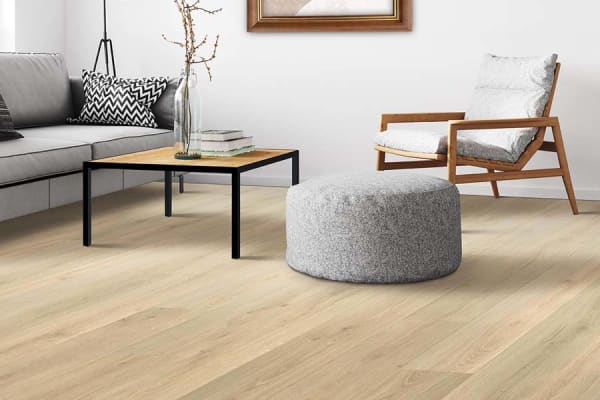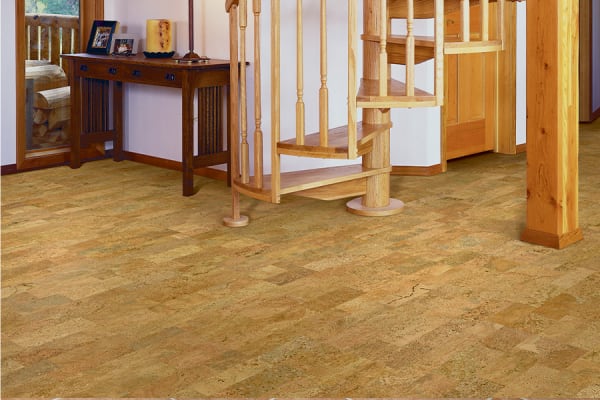Laurel , MD (301) 618-0750
Germantown, MD (301) 528-6400
Spring, MD (301) 460-4100
Elkridge, MD (410) 872-1129
Sustainable & Eco-Friendly Flooring for Home & Office
About Eco-Friendly Flooring Products
Many area residents
are interested in mitigating climate change and promoting sustainably
when they remodel. Eco-friendly
remodeling considers the needs of homeowners and the natural
environment. It improves living conditions by eliminating exposure to
harmful substances and chemicals while reducing a homeowner's carbon
footprint. Flooring manufacturers have been aware of this trend,
and many are offering flooring products that meet the three
objectives of being beautiful, being good to the environment and not
blowing your budget.
Eco-Friendly Flooring Options
Check out the eco-friendly options that we offer at FLOORMAX. If you’re interested to learn more, please contact us today to see which eco-friendly flooring options are right for you and your home!
Engineered Hardwood
This type of flooring has it all; it’s a natural material that consists of real wood. It combines a solid hardwood and a core of plywood designed to make it a beautiful and durable option to traditional hardwood. Engineered hardwood also has low VOC levels which means fewer chemicals in your home. Browse hardwood flooring
Cork
Cork comes from the bark of the cork oak tree which means that the trees themselves stay standing. The bark grows back within three years making it a renewable resource. Some cork floors even consist of recycled corks from wine bottles. These floors also repel mold and allergens making it a great flooring to preserve the air quality in your home. Browse cork flooring
Bamboo
Bamboo grows incredibly fast and is one of the most environmentally friendly products because of this. These trees mature after 3-5 years compared to the decades it takes for many hardwood trees to mature. There is a lot of variety in appearance when it comes to bamboo including various textures, grains, and stain colors.
Wool Carpet
Wool carpet is natural, durable and has a luxurious feel. It also provides a warmth and comfort that other flooring options don’t provide. Wool is non-toxic and is also a sustainable resource.
Marmoleum
Linoleum used to be a very popular type of flooring decades ago. Marmoleum is a new take on linoleum and has made a huge comeback. This material is made from natural, rapidly renewable, raw materials. This flooring is also flame and moisture resistant. Manufacturers have started to create this flooring in a wide range of colors. This flooring is also CO2 neutral (cradle to gate).
Rubber Flooring
Some rubber flooring is made from recycled tires further making it a sustainable choice for flooring. Less energy is required when manufacturing this product. It also provides a nice cushion. This flooring can also be recycled when it’s no longer needed helping to keep it out of landfills.
Engineered Hardwood
This type of flooring has it all; it’s a natural material that consists of real wood. It combines a solid hardwood and a core of plywood designed to make it a beautiful and durable option to traditional hardwood. Engineered hardwood also has low VOC levels which means fewer chemicals in your home. Browse hardwood flooring
Cork
Cork comes from the bark of the cork oak tree which means that the trees themselves stay standing. The bark grows back within three years making it a renewable resource. Some cork floors even consist of recycled corks from wine bottles. These floors also repel mold and allergens making it a great flooring to preserve the air quality in your home. Browse cork flooring
Bamboo
Bamboo grows incredibly fast and is one of the most environmentally friendly products because of this. These trees mature after 3-5 years compared to the decades it takes for many hardwood trees to mature. There is a lot of variety in appearance when it comes to bamboo including various textures, grains, and stain colors.
Wool Carpet
Wool carpet is natural, durable and has a luxurious feel. It also provides a warmth and comfort that other flooring options don’t provide. Wool is non-toxic and is also a sustainable resource.
Marmoleum
Linoleum used to be a very popular type of flooring decades ago. Marmoleum is a new take on linoleum and has made a huge comeback. This material is made from natural, rapidly renewable, raw materials. This flooring is also flame and moisture resistant. Manufacturers have started to create this flooring in a wide range of colors. This flooring is also CO2 neutral (cradle to gate).
Rubber Flooring
Some rubber flooring is made from recycled tires further making it a sustainable choice for flooring. Less energy is required when manufacturing this product. It also provides a nice cushion. This flooring can also be recycled when it’s no longer needed helping to keep it out of landfills.

Bamboo

Engineered hardwood

Cork
Eco-Friendly Certifications
There is a myriad of certifications that flooring manufactures go
through to meet high sustainability and industry standards. They have
taken careful steps to ensure that their products meet with the
industry flooring standards – to be LEED certified, to make sure
wood harvested for flooring is compliant with the Lacey Act, to make
that flooring fits the FloorScore Program, to be Green Label Plus
certified and to fit within the FCS – The Forest Stewardship
Council. Read below to familiarize yourself more with these
certifications.
If you’re interested in purchasing flooring that was either sustainability harvested or manufactured, please let us know and we will be sure to point you in that direction!
If you’re interested in purchasing flooring that was either sustainability harvested or manufactured, please let us know and we will be sure to point you in that direction!
- LEED: LEED stands for “Leadership in Energy and Environmental Design,” and is a third-party green building certification program and the globally recognized standard for the design, construction and operation of high-performance green buildings and neighborhoods. This rating system approach focuses on efficiency and leadership to deliver the triple bottom line returns of “people, planet and profit.” LEED recognizes achievements in location, planning, sustainable site development, water savings, energy efficiency, materials selection, waste reduction, indoor environmental quality, innovative strategies and attention to priority regional issues.
- Lacey Act: The Lacey Act which was initially enacted in 1900 is a United States conservation law that bans trafficking in fish, wildlife or plants that are illegally taken, possessed, transported, or sold. This affects the way trees are harvested for flooring. In 2008, the act was amended to include two plant amendments; a ban on trading plants or plant products harvested in violation of the law; and a requirement that importers of plants and plant products file a declaration identifying the scientific name, value, quantity and country of harvest for most plant products.
- FloorScore Program: The FloorScore Program is the most recognized indoor air quality (IAQ) certification standard for hard surface materials, adhesives and underlayments. This is a voluntary, independent certification program that tests and certifies hard surface flooring and associated products for indoor air emissions and volatile organic compounds (VOCs).
- Green Label Plus: Green Label Plus is an industry standard set by the Carpet and Rug Institute that relates to carpet and the VOCs (volatile organic compounds) and indoor air quality (IAQ). Indoor air quality is such an important consideration since most American spend about 90 percent of their time indoors. This program tests carpet, cushions and adhesives used when installing carpet and helps to identify products with low VOCs. It also sets high standards for IAQ and lets customers know that they are purchasing the very lowest emitting products on the market. Using scientifically stablished standards, the Green Label Plus program symbolizes the carpet industry’s commitment to creating a better indoor environment.
- FCS: The Forest Stewardship Council: This is an independent, non-profit organization that protects forests for future generations. They’ve developed 10 principles and 57 criteria that apply to the FSC-certified forests around the world.









